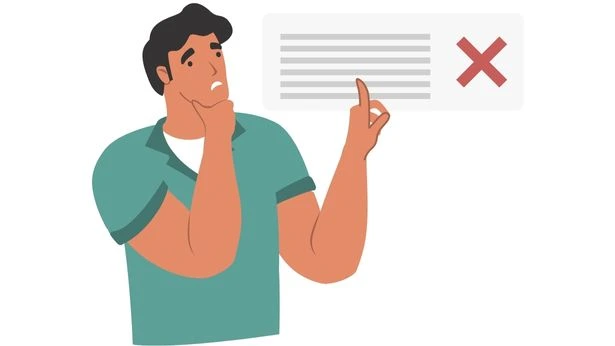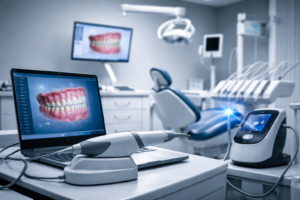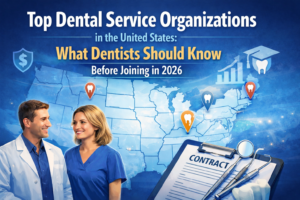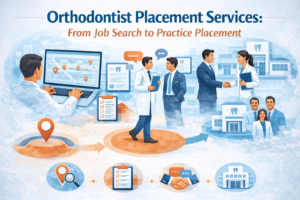Mistakes to Avoid in Your First Dental Job
Starting your first dental job tips can be exciting and challenging at the same time. This is the onset of a long and rewarding professional path, but many new dentists often face unexpected obstacles.To know what to expect and to avoid which normal trap can make all the differences in creating a strong foundation in your career. This blog will guide you through the top 5 mistakes that new dentists make and how to avoid them as you start your dental career.
Top Five Mistakes to Avoid in Your First Dental Job

1. Forgetting Mentorship Opportunities: Common mistakes new dentists make include attempting to do everything independently. One of the largest mistakes is not seeking a mentor. Working with a veteran dentist can provide you with practical experience skills that were not taught in dental school.
A mentor can assist you with treatment planning, communication with patients, management of the practice, and even emotional support in tough cases.
Dental career guidance for newbies highly recommends having a mentor in your clinic or becoming part of professional dental networks. Watching how an experienced dentist works on tricky cases will enhance your skills and confidence fast.
2. Rushing Through Procedures: Another one of the common dental job mistakes is getting rushed on the procedures in order to maintain pace with scheduling or productivity targets. Fresh dentists may be compelled to accomplish unrealistic time targets, particularly in hectic clinics. This causes errors, rework, and poor patient results.
3. Poor Communication With Patients: One of the common problems at the start of your dental career is underestimating the importance of communication. Most new dentists concentrate on clinical skills and tend to forget that dentistry is also a people-oriented profession. Clarify procedures in managing terms, hear the patient out, and minimize medical terminology. Proper communication enhances patient comfort, compliance, and retention. These soft skills are as essential as drilling and filling.
4. Not Understanding Business Basics: Being a dentist is not all about fixing teeth. One of the most crucial first dental job tips is knowing the business of the practice. That means scheduling, billing, insurance coding, and keeping the schedule full of patients.
Finding out how your clinic operates financially will make you more efficient and useful as a team member. Inquire regarding patient flow, treatment acceptance, and case presentations. You will also be better prepared if you want to have your own practice someday.
5. Forgetting Self-Care and Work-Life Balance: Among all the mistakes new dentists make, neglecting personal wellness and balance is usually not given much importance. New dentists may easily become burnt out due to working excessive hours, missing meals, or failing to take breaks.
Take care of your body and mind. Keep a good posture, spend money on ergonomic equipment, eat nutritious food, and get adequate rest. A rested dentist produces fewer errors and has improved interactions with patients and personnel.
Also Read: How to Find a Dental Job after Graduation
Bonus Tips for a Smooth Start

Apart from avoiding the mistakes of dental jobs, below are some crucial dental career tips for beginners that will assist you not just in surviving but actually flourishing in starting your dental career.
1. Keep Learning: Learning does not end when you are out of dental school. New methods, technology, and treatment protocols are evolving daily in dentistry. Develop the following habits:
Participate in workshops, seminars, and hands-on training sessions.
Take short-term certification programs or specializations.
Subscribe to credible dental journals and podcasts.
2. Ask Questions: One of the biggest mistakes first-time dentists commit is acting like they know everything instantly. Please remember that no one expects you to know it all on day one. The more you question, the more you learn. Asking questions is a sign of curiosity and growth, not weakness.
3. Be Open to Feedback: Constructive criticism is a valuable tool for improvement. Whether it comes from a senior dentist, dental assistant, or even a patient, use it as a stepping stone. Early in your career, feedback will be one of your most powerful teachers.
4. Be Kind and Compassionate to Every Patient: Clinical competence is important, but how you treat individuals determines your long-term success. Listen actively, keep a soothing tone, and detail treatments in simple language.
Final Discussion on Common Dental Job Mistakes
Beginning your first dental job is a milestone and comes with equal parts excitement and anxiety. Being aware of the typical dental job blunders, and consciously following the proper first dental job advice, you can stay away from the mistakes often encountered by new starters.
Whether you’re looking for a mentor, effective communication with patients, or the business aspects of dentistry, each step you make with intention will enable you to create a solid, prosperous, and rewarding dental career.
Ready to kick-start your dental career the right way? Avoid the most common early-career pitfalls and step into success with confidence. Explore the right dental jobs opportunity that matches your goals and supports your growth. For personalized guidance, job openings, and mentorship connections, contact Hire Smiles today and let your journey begin.
FAQs on Mistakes to Avoid in Your First Dental Job
Q1. What are the most important things to know when beginning your very first dental job?
The most important things one needs to know are your clinical boundaries, learn how the clinic works, and develop good communication and time management skills.
Q2. How significant is mentorship in a career in dentistry?
It is very important to have a mentor to guide your clinical, emotional, and professional growth, particularly in your initial days.
Q3. How do I prevent burnout as a new dentist?
In order to prevent burnout as a new dentist is to keep a good posture, work in intervals with regular breaks, eat a healthy diet, get proper rest, and establish healthy boundaries between your professional and personal life.
Q4. Should I prioritize speed or accuracy in my work at my first job?
Accuracy must always be prioritized. Speed will automatically develop through practice and experience.
Q5. What are some typical patient communication errors by new dentists?
Some of the typical patient communication is not using too much medical knowledge, ignoring patient concerns, or not clearly explaining the treatment plan.
Q6. Why should I learn about the business side of dentistry?
It makes you more efficient, teaches you your place in the clinic, and prepares you for potentially opening your own practice in the future.
Q7. What should I study after dental school?
Think about practice management, cosmetic dentistry, or specialized training based on your area of interest to develop your expertise.
Q8. What is the best way to get the first job in the right clinic?
Search for a positive work environment, transparent chances of growth, and preferably a guide or mentor who can guide you through your first year.
Related Article: 10 Useful Tips to Find the Perfect Dental Job





